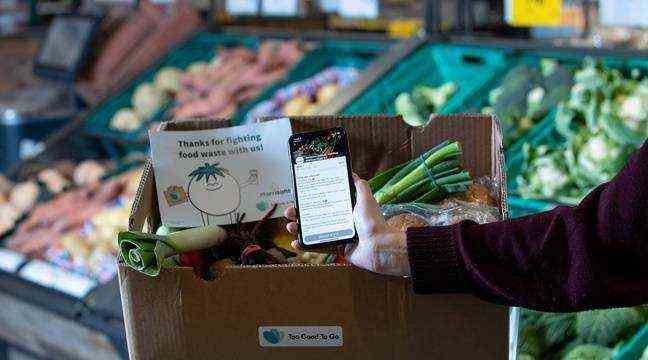Illustrative image, anti-waste – PinPep / REX / SIPA
- Food “anti-waste” apps make it possible to collect unsold items from restaurants or supermarkets at lower prices.
- Since the start of the health crisis, the number of their downloads has increased.
- Some use them not to waste, others to save money. 20 minutes gives them the floor.
Antigaspi, a mode of consumption accelerated by the Covid-19? When on the one hand, the health crisis has undermined the food budget of many French people (young workers, students, unemployed, elderly people, etc.), others saw it as an opportunity to get their hands dirty in the kitchen, lack of opportunities to eat outside. Bread dough, cakes, traditional dishes… As we have observed, many of you have turned into cooks since the first confinement.
In this very particular context, the way of consuming has evolved. Because who says more races, says more expenses. Fill your trolley at low cost thanks to unsold products from supermarkets, recover surplus from restaurants in the evening, take advantage of donations between individuals … Anti-waste applications, which existed for the most part before the crisis, have seen their number of users increase, such as the recently reported
The Parisian. And there are many: Too Good To Go, Save Eat, Geev, HopHopFood… “Clearly, the figures have multiplied by 6 between March 2020 and March 2021. A year ago, we had 300,000 users, today 1.8 million », Claims Jean Moreau, CEO of Phenix. An app that offers you to collect a basket of unsold products from merchants near your home for about half the cost.
“I never know what to cook, so there, I adapt to what I am given”
These users, 20 minutes gave them the floor. Among them, many varied profiles. From “zero waste” ecologists convinced to people who do it for the sake of economy, the health crisis has converted, out of necessity or curiosity, a good number of French people. “I like the idea of not wasting and these are products that I would not buy,” says Maude, who answered our call for testimonials. It saves me going to the supermarket. In addition, I never know what to cook, so there, I adapt to what I am given ”.
Like her, Karine has been using Too Good To Go for two months. “Before, I often bought products in the“ anti-waste ”areas of stores. It allows me to discover products that I would not normally buy, and to put diversity in my meals, which are usually ordinary and repetitive. It also saves money in view of the price of the products ”.
“The economic axis takes precedence over the ecological”
Because contrary to what one might think, those who do it for ecological reasons do not form the majority of users, explains the boss of Phenix. “At the base we had committed and militant people who did this for the responsible side. Today, for 70% of our users, the economic axis takes precedence over the ecological axis. 70% are CSP- who do not have high incomes, who are not “sores” “.
For many therefore, like Delphine, reader of 20 minutes, “Saving money” via applications is essential. With a husband on sick leave and her part-time job, not to mention their two teenagers, she has become a regular user.
More or less successful surprises
Problem (or not): via most apps, the user cannot know what will be in his “surprise basket” before retrieving it. Which can cause disappointment. “I am mixed, because there are traders (supermarkets) who do real anti-waste, but some restaurants use this concept to increase their turnover, often the product qualities are poor,” deplores Chen.
On the contrary, for some, not knowing in advance is rather positive. “There is the aspect of surprise that adds a lot to this purchase. You never know what you are going to have, and “unboxing” between roommates is always expected, with each our recipe ideas that fuse each time an ingredient is discovered, ”explains Alexis, a very enthusiastic user of Phenix.
Invest in local and sustainable
Finally, for Jean Moreau, the anti-waste apps had the merit of “democratizing” this type of consumption. “Before, people didn’t dare say they were buying unsold goods. The emergence of apps has made anti-waste almost cool. It has almost become commonplace, and it will become a new standard of consumption, ”he hopes.
Catherine Rolin, in charge of the waste prevention and management mission at France Nature Environnement (FNE), also sees something positive in this. “With this health crisis, people are asking a lot of questions. Deprived of everything, we realize the value of things, including food. Lots of people realize that these are not green dreams, and try to do what they can at their level ”.
But these apps are not, according to her, an end in themselves to fight against waste and consume more locally. It would be necessary, resumed the project manager, for awareness to take place over time and go beyond food, to reach all types of products. Like textiles, for example. “We are optimistic because things are progressing, but pessimistic because things should go faster,” concludes Catherine Rolin. The apps bring their little stone to the building. We must be attentive to the savings we make so that they are invested in local or sustainable. “

